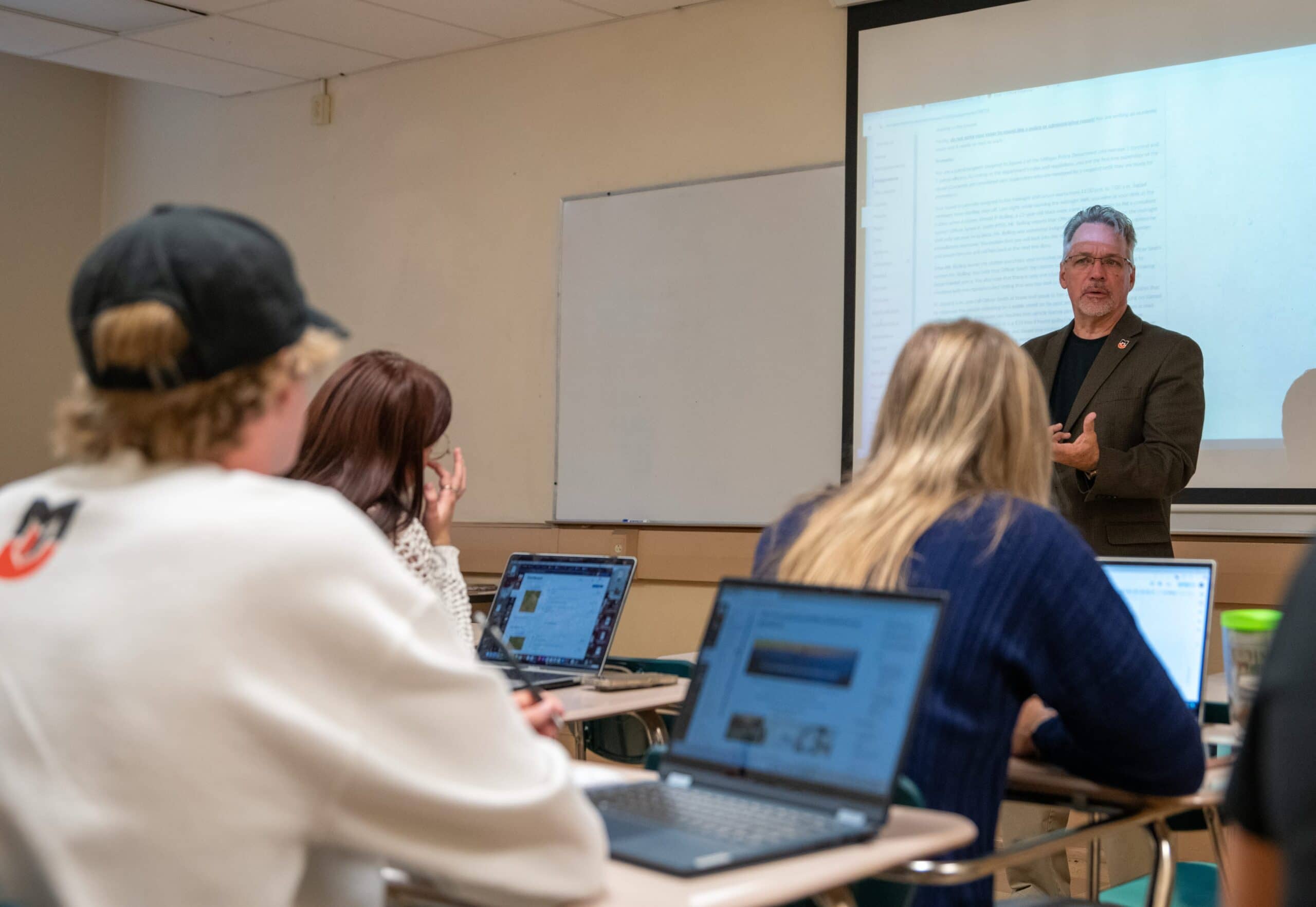Explore the Mathematics Major at Milligan
Milligan University’s Mathematics major provides students with a strong foundation in core mathematical disciplines such as calculus, algebra, and logic. The program emphasizes the development of analytical thinking, communication skills, and real-world problem-solving.
Students graduate with the ability to analyze abstract ideas, solve complex problems, and clearly communicate mathematical concepts to diverse audiences. Whether pursuing a career in education, industry, or research, graduates are well-prepared to make a meaningful impact.
SCHOOL OF SCIENCES & ALLIED HEALTH
Bachelor of Science (BS), Mathematics Minor
While in the transferring process last fall, I looked for a small Christian community that would give me amazing academic and athletic opportunities, and Milligan has done just that!”
Zoie Larkins | Class of 2025

Your Career Options with a Mathematics Degree
A Mathematics major from Milligan University prepares you to excel in fields like teaching, data analysis, or industry. Graduates gain versatile skills that open doors to innovative careers and advanced study.
Potential Careers
Mathematics Educator
Teach middle or high school students, inspiring a love for math.
Data Analyst
Solve complex business problems using mathematical models and statistical tools.
Actuary
Assess financial risks for insurance and investment firms.
Engineer
Apply mathematical principles to design and build innovative solutions.
Research Scientist
Contribute to advancements in mathematics, science, or technology.
Cybersecurity Analyst
Protect systems and data through advanced cryptographic techniques.
Interdisciplinary Opportunities
Other Majors Commonly Combined with a Mathematics Major
Many students combine the Mathematics major with other disciplines to expand their skills and career opportunities. Common combinations include:
- Data Analytics
- Economics
- Accounting
- Computer Science
- Information Systems
- Cybersecurity
- Engineering
- Chemistry
- Biology
- Physics
This interdisciplinary approach enables students to develop versatile expertise applicable across various industries.
Mathematics Faculty
Frequently Asked Questions
What Does the Mathematics Major Include in the Program?
Milligan’s Mathematics major offers a comprehensive curriculum designed to develop proficiency in core mathematics areas such as calculus, linear algebra, and logic. Students explore applied mathematics and probability while building essential analytical thinking and problem-solving skills. The program emphasizes oral and written communication, equipping students to clearly convey abstract mathematical ideas in various professional and academic settings.
This Bachelor of Science in Mathematics prepares students for careers in teaching, industry, and government. The program also provides a solid foundation for advanced studies in mathematics, engineering, or social sciences. Milligan’s curriculum is enhanced with real-world applications, ensuring students understand how to use their mathematical knowledge in practical scenarios.
Students will engage in courses like linear algebra, statistics, and geometry while also exploring electives to tailor their education. With opportunities for collaborative research, internships, and mentorship from dedicated faculty, Milligan’s Mathematics major prepares graduates to succeed in diverse career paths or pursue advanced degrees.
What Career Opportunities Are Available for Mathematics Graduates?
A degree in Mathematics from Milligan University opens the door to a wide array of career options. Graduates often pursue teaching in secondary schools or advance to roles in industries such as data analysis, actuarial science, and cybersecurity. Applied mathematics and statistics are particularly in demand across sectors like technology, finance, and healthcare.
For those interested in further education, Milligan’s rigorous curriculum prepares students for graduate studies in mathematics, engineering, or related fields. Careers in research, algorithm design, and quantitative analysis are also common paths for alumni. Milligan graduates are highly sought after because of their strong foundation in mathematics education, their ability to solve complex problems, and their expertise in fields like probability and statistical modeling.
The program’s emphasis on combining theoretical understanding with practical application ensures students are ready for the workforce. Whether you’re aiming to teach, solve real-world problems, or innovate in data science, Milligan’s Mathematics major equips you with the tools to excel.
Can I Combine the Mathematics Major With Another Field of Study?
Yes, Milligan’s Mathematics major is highly flexible and can be paired with other disciplines to enhance your career prospects. Popular combinations include computer science, economics, engineering, and data analytics. By integrating mathematics with fields like information systems or social sciences, students expand their skill sets and open up opportunities in interdisciplinary careers.
For example, pairing mathematics with computer science prepares students for careers in algorithm design or software engineering. Combining it with economics can lead to roles in market analysis or financial modeling. Students interested in environmental or biological applications often pair mathematics with chemistry or biology.
Faculty advisors work closely with students to recommend course sequences and help plan dual majors or minors. This interdisciplinary approach ensures that students can align their academic pursuits with their professional aspirations, making the program a versatile choice for those seeking diverse career paths.
What Support Will I Receive as a Mathematics Major?
Milligan University provides a supportive and collaborative environment for mathematics majors. Small class sizes foster personalized attention from faculty, ensuring students receive the guidance they need to succeed. Professors mentor students through challenging coursework, help with research opportunities, and offer advice on internships and career planning.
The Department of Mathematics encourages practical learning through collaborative projects and internships with local organizations. Students gain hands-on experience in applied mathematics and statistics, which strengthens their problem-solving skills. Faculty also assist students in preparing for graduate programs in mathematics, engineering, and related fields by guiding them through the application process and helping them build a strong academic portfolio.
Additionally, Milligan offers opportunities for peer collaboration and extracurricular activities to enrich the learning experience. From solving sample equations in study groups to participating in department-hosted events, students have numerous ways to connect with peers and professors. This supportive atmosphere ensures students graduate with confidence and a clear path forward.
What Courses Are Offered in the Mathematics Major Program?
Milligan’s Mathematics major includes a robust selection of courses covering core mathematics and applied topics. Students begin with foundational courses like calculus and probability and progress to advanced topics such as linear algebra, differential equations, and statistics. Elective options allow students to tailor their studies to their career interests, whether in general mathematics, mathematics education, or fields like data analysis and engineering.
The program’s curriculum is structured to provide a well-rounded understanding of mathematics while offering flexibility through electives. Students may also engage in research projects, giving them the chance to apply their knowledge to real-world challenges. This rigorous coursework prepares students for professional roles and graduate programs in mathematics or related disciplines.
How Does the Program Prepare Students for Teaching Careers?
Milligan’s Mathematics major includes a strong emphasis on mathematics education, equipping students with the skills to teach effectively in high schools and middle schools. The program integrates theoretical knowledge with practical teaching methodologies, ensuring students are ready to step into classrooms upon graduation.
Core courses in general mathematics, geometry, and statistics are complemented by classes in pedagogy and teaching methods. Students gain experience through practicums and classroom observations, which are designed to build confidence and teaching expertise. Faculty mentors guide students through licensure requirements and help prepare them for successful careers in mathematics education.






